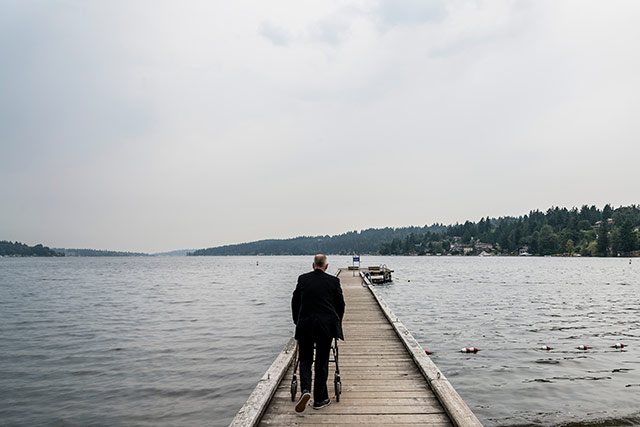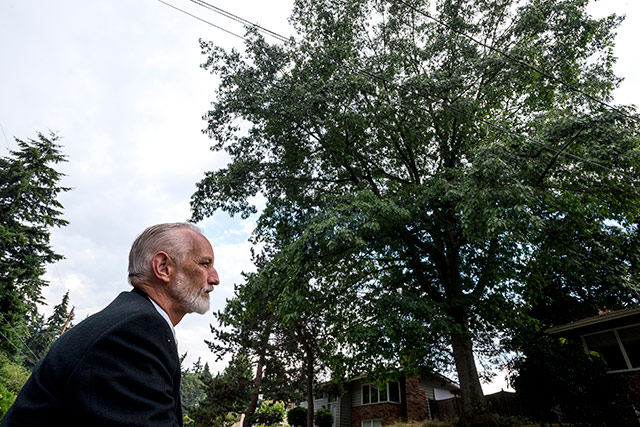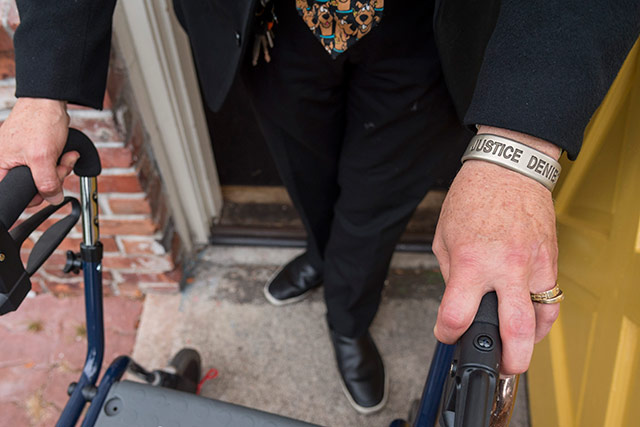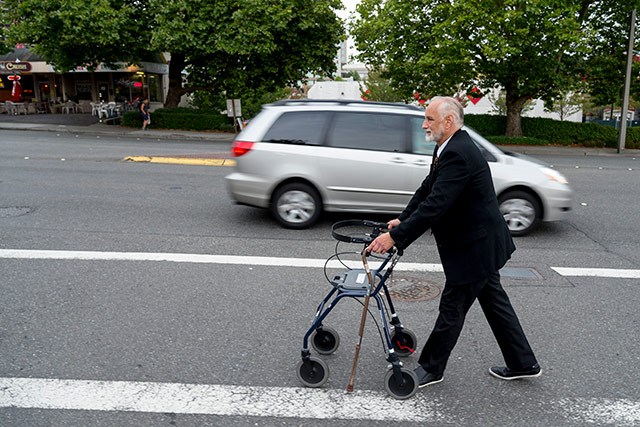Jack Williams rejects the table the
hostess has chosen in the middle of the Mexican restaurant. He asks for
the least desirable faux-leather booth in the back corner, where he can
sit with his back to the wall. He can't stand to have people come up
behind him. That's what his rapist, an assistant drill sergeant in the
Air Force, did almost 50 years ago.
It happened three times, always at about 3 in the morning.
After
the third time, Williams walked into the shower at his barracks at
Lackland Air Force Base, tied a few towels together and tried to hang
himself. Security guards found him unconscious.
A part of Williams died that day in 1966. He was 18. He has not been whole since.
Now
66, he looks back and ponders what his life might have been had he
accomplished what he set out to do: to serve his country with pride.
Instead, he has lived with rape for 47 years, with permanent injuries
that make him depend on a walker, with words like "pansy" and "coward"
ingrained in his head.
Sexual
assault is one of two high-profile problems plaguing the military;
suicide is the other: Twenty-two veterans take their lives every day.
Williams harbors both demons in his head. He is caught in the nexus of the military's two tragedies.
In
May, the Pentagon released results of an anonymous survey on sexual
assault: Twenty-six thousand service members reported that they had been
sexually assault or harassed in 2012, up from 19,000 the previous year.
Women
get most of the attention on this issue because, proportionately, their
numbers are much higher. Women make up only about 15% of the
active-duty force but account for 47% of sexual assault victims.
Headline-grabbing
scandals have usually involved women. Two decades ago, at the Navy's
"Tailhook" convention in Las Vegas, drunken aviators assaulted female
recruits. Five years later, the Army brought charges against 12
commissioned and noncommissioned officers for the sexual assault of
female trainees at Aberdeen Proving Ground in Maryland. Most recently,
22 instructors were convicted in the Air Force's worst sex scandal at Lackland, where Williams was raped almost five decades ago.
It's
men like him who make up most of the military's sexual assault cases,
even though they are less likely to report their assaults. The Pentagon
survey found 13,900 male victims. But 76% do not file complaints.
"There's
an assumption that rape doesn't happen to men, or they must have been
weak and not strong enough to fight (an assailant) off," says Sue
Garrison, a psychologist at the Bay Pines VA Healthcare System in
Florida.
Bay
Pines is the only Department of Veterans Affairs facility in America
that offers residential treatment for male victims of military sexual
assault as well as women. Evidence suggests that men may suffer more
severe symptoms and are less likely to get help, raising the specter of
other problems, like suicide.
Williams recalls time spent on this fishing pier with his daughter as among the best days of his life.
Stuart Isett for CNN
The causes of suicide are complicated and not wholly understood, but a contributing factor among veterans is sexual trauma.
A
study by former Air Force psychologist Craig Bryan found that military
victims of violent assault or rape were six times more likely to attempt
suicide than nonvictims.
One
key reason is the enormous sense of betrayal that service members feel
when they are assaulted by a brother in arms. The loss of trust is
magnified, says Bryan, because the military is such a tight-knit
organization whose success depends on group unity and cohesion. And
there is little action a victim can take other than report it.
"When
it happens, you can't just quit your job or move barracks," Bryan says.
"So victims feel more trapped and violated." They may worry about
retribution and the impact on their careers.
A string of recent sexual assault cases has ratcheted up pressure on the military and Congress to curb the problem. One scandal involved the Air Force's former head of sexual assault ..., Col. Jeffrey Krusinski, who was arrested in May after he allegedly grabbed a woman's breasts and buttocks.
For Williams, change will come too late. But it's long overdue.
"I
am angry that others are going through this," he says. "If it isn't
kept in the spotlight, it will go back to business as usual."
And that means more men with the most honorable intentions are destined to suffer -- and maybe even die.
It's not just about the rape
Williams
tells his story on a drive from the Mexican restaurant to a split-level
brick house in the suburban city of Bellevue, the childhood home where
he nurtured his dreams.
In
1966, some young men feared the Vietnam War enough to dodge the draft.
Williams could have, too. A bout of rheumatic fever at 3 could have made
him eligible for a medical exemption because the ailment can lead to
heart damage. But Williams volunteered for the Air Force.
His
grandfather fought in World War I. His uncle fought in the Battle of
the Bulge during World War II. His father was in the Army. Williams
figured it was his turn. He was suited for that line of work. At 14,
he'd gone through rigorous training to become a police cadet. Besides,
it was a matter of honor.
In
June, he reported to Lackland Air Force Base near San Antonio, Texas.
It was where the fresh blood was trained, transformed in a matter of
weeks from frightened young men to warriors. There were no calendars, no
watches allowed in boot camp. One cadet scratched marks on the wall to
count the days.
The
only respite from a brutal regimen came in the few hours of sleep. But
even that was taken from Williams soon after his arrival.
"I planted that in September of '65," he says of the oak at his former family home. "It was only 6 feet tall then."
Stuart Isett for CNN
In the barracks, 46 guys slept on the top bunks, 46 on the bottom.
In the dead of night, the assistant drill sergeant woke Williams and ordered him to a second-floor office.
Williams
stood before the sergeant in his government-issue T-shirt and boxers.
He stared straight ahead, like he was supposed to. Suddenly, the
sergeant choked him, threw him on the floor.
"He was all over me. He was raping me."
After it was over, Williams cleaned himself up and went back to bed.
"In the military, everyone pulls together. I did not want to be the one who let everyone down."
During
training, the cadets were not allowed to make phone calls. They were
not allowed to leave base. Williams kept the rape to himself, afraid to
report a superior and ashamed of what others would think.
"In 1966, to be labeled a homosexual was like being labeled a child molester," he says.
Then,
a few days later, it happened again. And again. The drill sergeant beat
him and knee-dropped onto his kidneys. Williams was afraid to fall
asleep at night. To stay awake, he sewed buttons and patches on his
fellow cadets' uniforms.
To
make matters worse, Williams fell hard on rocks during a physical
training exercise and damaged his back. He was scarred for life,
physically and mentally.
After
the third rape, he went to talk to the drill sergeant. By then, other
cadets had reported seeing blood in Williams' urine. His bladder was
damaged, but he was not hospitalized until many weeks later. Only one
kidney was functioning then. He remembers being told in the hospital
that he might not make it.
By
December of that year, the Air Force career that Williams coveted was
over. He was honorably discharged for medical reasons and sent home to
suburban Seattle.
"I
did not get timely and appropriate medical care. They discharged me
when I wasn't dischargeable. Like a dummy, I kept doing what they told
me to do."
Williams
tried to resume life in Seattle. He bought a house on Bellevue Way even
before he got married so that he would not have to start a family in an
apartment. He got jobs at Boeing and other places. But he couldn't make
anything work.
He tried school and attended Bellevue Community College from 1972 to 1974. But he couldn't finish his degree.
Physical
problems plagued him around the clock. He soiled himself constantly
from the damage to his bladder and took pills to kill the back and neck
pain. He suffered from depression. He slept with a light on. He had
difficulty making decisions and lacked self-esteem.
He
got married four times over the course of several decades. He didn't
think he deserved a wife -- he called himself "damaged goods" -- so he
settled for anyone willing to put up with him. All his marriages ended
with divorce.
He
had a daughter named Wendy and loved to take her to Enatai Beach Park.
She carried her fishing tools in a little black purse, and father and
daughter spent hours on the old pier.
"I held my pieces together to raise my daughter," he says. "After she left for college, I lost purpose in life."
At
one point, he found himself sleeping in his car and developed a routine
of eating one meal at Jack in the Box and skipping the next three. He
battled the VA for medical treatment for his physical and mental
problems.
No one was ever convicted of raping him. No one reached out to help him. He felt betrayed by his own government.
In 2004, he tried again to end his life, this time with alcohol.
"I
have service-connected problems," he says. "I should be able to get
help. I've had to learn how to live with the pain. I have not felt like I
deserved anything.
"They treat all of us this way. That's why so many of us are committing suicide."
His
rape went unacknowledged in his military records. It wasn't until last
year that the Veterans Administration recognized that Williams had been
sexually assaulted. He was given a 70% disability rating for
post-traumatic stress disorder and a 40% rating for lower back
impairment. The VA said it based its review on the informed opinion of
psychiatrists and statements from Williams' mother and a fellow Air
Force recruit.
"We have therefore conceded corroboration of these traumas," the VA said.
One
of Williams' former therapists, Dr. Robert Baize, says Williams will
need counseling the rest of his life. He was suicidal twice. He could be
again.
Men are victims, too
Williams and other survivors of sexual assault and suicide are speaking out to help prevent more suffering and death.
Williams' disability stems partly from his rape. "Justice Denied" is a film focusing on male victims.
Stuart Isett for CNN
Some
told their stories in the critically acclaimed documentary "The
Invisible War," which featured victims of military sexual assault.
Another emotionally exhausting film, "Justice Denied," focused
specifically on male victims.
The
men in "Justice Denied" believe that the power of the military, coupled
with ignorance in society about the devastating effects of sexual
assault on men, has resulted in government failure to address what they
call a super-silent epidemic.
The
pressure for male victims to keep it all inside is enormous, says Brian
Lewis, 33, the first male rape survivor to testify before Congress.
He
was raped in August 2000 by a superior noncommissioned officer aboard
the USS Frank Cable. He was given a personality disorder diagnosis and
discharged from the Navy after he reported the crime.
"Men
are still invisible and ignored as survivors of military sexual
trauma," Lewis told the Senate Armed Services Committee in March.
He
believes that America as a culture has moved beyond blaming female
victims for sexual assault but not male victims, and especially not men
in the military. They are trained to be tough, to kill.
"I think the general public expects men in the military to defend themselves and are not seen as a victim of a crime," he says.
Or they are seen as being weak or homosexual.
"It's not about sex," Lewis says. "It's about power and control."
Some
are perceived as liars. Lewis remembers a psychiatrist at the Naval
Medical Center in San Diego telling him that he had made up his story.
"I
was there to seek help, and he had basically put a knife in my heart. I
don't think I have any words to describe what that moment felt like."
He, like Williams, tried to hang himself. He survived because he didn't know how to tie a proper knot.
"That is a horrible thing for a Navy guy to admit," Lewis says.
He
can muster a joke now that he is speaking out, trying to get Congress
to pass legislation -- known as the STOP Act -- that would take the
reporting, investigation, prosecution and oversight of sexual assault
cases out of the chain of command and place it under the jurisdiction of
an autonomous oversight committee.
"The
military is fundamentally incapable of addressing the crime of sexual
assault because the entire justice system is rigged around a commanding
officer's authority," Lewis says. "That officer has to choose between
two people who are telling opposite stories.
Williams' sexual assault wasn't recognized by the VA for 46 years. He may always need counseling.
Stuart Isett for CNN
"I
carry my discharge as an official and permanent symbol of shame, on top
of the trauma of the physical attack, the retaliation and its
aftermath," Lewis told lawmakers on the Hill. "I fear it will be
discussed when I apply for law school, when I apply to take the bar
exam, even when I apply for a job, and I wonder what opportunities it
may destroy for me. No one should be forced to undergo such painful and
inappropriate treatment."
Williams knows how rape can destroy the life of a young man like Lewis. He stands as testament.
A coward dies a thousand deaths
The
car turns right onto 117th Avenue in Bellevue's Newport Hills
neighborhood and stops at No. 5031. It's the house Williams' parents
purchased after the family moved from California in 1965.
Williams steps out of the car, straightens his Scooby-Doo tie. He thinks he should be dressed well in public.
He looks at the towering oak in the front yard.
"I planted that in September of '65," Williams says. "It was only 6 feet tall then." Now, it stands at least 50 feet.
Williams
likes to talk about the things he was able to accomplish in his early
life. He boasts that he put up all the antennas in this neighborhood. He
points to the living room of the split-level house. "I got married
there, in front of the fireplace," he says.
A neighbor, curious about strangers parked outside, walks up to Williams. "May I help you?"
"Oh, we're just looking," he says. "I used to live in that house. I joined the military from there. I'm a Vietnam-era veteran."
It
feels good for Williams to say that aloud. He lives burdened by guilt
that he never shipped out for a combat tour with the rest of the guys;
that he got to live when others died. Vietnam, he says, "That's
unfinished business."
He
borrows from Shakespeare. "A coward dies a thousand deaths; a brave man
but once. When you are told you are a coward, you die those thousand
deaths."
It's about to rain. Williams' wispy white hair flutters in the breeze. Tears stream down his gaunt face.
He
doesn't know whether the assistant drill sergeant who raped him is
alive still. He'd like to show him X-rays of his broken body. He'd like
to tell him the horror within that will never die.
Outside
his old house, he says goodbye to the curious stranger and begins to
fold up his walker to put in the back seat. Things, Williams tells the
man, aren't always what they appear to be.
As
a symbol of his troubles, he wears an orange wristband on his left arm
with the number of a veterans' crisis line. Next to it is another band
with the name of the film he is in: "Justice Denied." He makes sure the
two always overlap.
source
SATANISM & MESSAGE TO POLICE & ARMY
mark passio's exposé about the real function of the armed forces and the police at the free your mind conference
SATANISM & MESSAGE TO POLICE & ARMY
mark passio's exposé about the real function of the armed forces and the police at the free your mind conference




Geen opmerkingen:
Een reactie posten